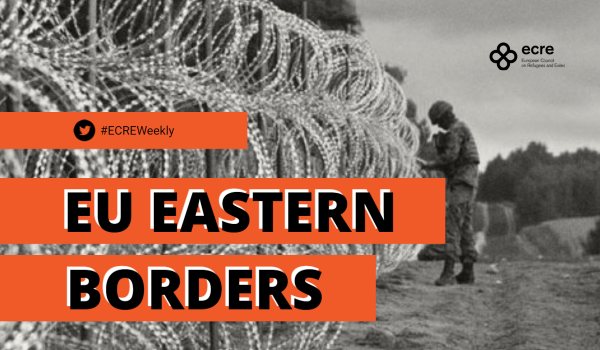The Un Refugee Agency (UNHCR) has updated and increased the scope of its data on the Ukrainian displacement crisis to better reflect recent movements. According to the European Union Agency for Asylum (EUAA) reports a significant increase of asylum applications in the EU by Russian nationals.
The displacement crisis from Ukraine continues. On 13 June, UN Refugee Agency (UNHCR) has updated its data on the Ukraine Refugee Situation to present the estimated number of individual refugees recorded in 44 countries across Europe as well updates on border crossings from Ukraine since 24 February, movements back to Ukraine as well as temporary protection registrations in Europe. As of 13 June, some 7.5 million border crossings have been recorded from Ukraine, with another 2.4 million crossings back into the country since 24 February 2022. According to the new data, of the 4.9 million individual Ukrainian refugees recorded in Europe, 3.2 million have registered for Temporary Protection or similar national protection schemes. EUAA states that asylum requests filed by Russians (1,400) doubled from February, reaching the highest level since 2018 and recorded a notable increase in requests filed by citizens of Belarus, Azerbaijan, Tajikistan, Uzbekistan as well as Turkmenistan.
In a recent report the UN Special Rapporteur Human Rights of Migrants, Felipe González Morales pointed to state-of-emergency measures “increasingly applied along the external border of the European Union with Belarus, similar to the repeated government orders in Hungary since 2016 to respond to a “crisis situation caused by mass immigration”. The Special Rapporteur “notes with concern” the suspension by the governments of Latvia, Lithuania and Poland of “non-refoulement obligations, limiting access to protection under international refugee and human rights law and restricting the access of humanitarian actors, civil society, lawyers and journalists to the border areas, while disregarding interim measures issued by the European Court of Human Rights”. Further, Morales regret the potential consequences of the European Commission proposal published in December 2021 aimed “at supporting Latvia, Lithuania and Poland by establishing a set of emergency measures at external borders” stating that “If adopted, the proposal would allow States to apply accelerated border procedures to determine the admissibility of applications and provide simplified return procedures for asylum seekers, while delaying the registration of applications for international protection for up to a month”. Meanwhile, the Polish government has announced that it will abolish the no-access zone along its border with Belarus on 1 July, which had been imposed in September 2021, once the construction of the new wall between two countries aimed at stopping migrants from crossing to the EU is finalised. Poland stated that NGOs and journalists will regain access to some parts of the Belarus-Poland border after ten months of restrictions. This ban has been denounced by the judiciary, including the Supreme Court, and by humanitarian organisations and described as ‘unconstitutional’. Human Rights Watch (HRW) reported recently that “Poland unlawfully, and sometimes violently, summarily pushes migrants and asylum seekers back to Belarus, where they face serious abuses, including beatings and rape by border guards and other security forces”, and added that “at least one person drowned and another disappeared in March 2022 in the course of being pushed back”.
The Czech Republic has approved amendments to the so-called Lex Ukraine rules which cover the situation of refugees from Ukraine in the country to cope with the ongoing Ukraine displacement crisis. According to the regulation’s amendment, the state will stop providing refugees from Ukraine with accommodation and food assistance and end the issuing of visas and residence permits to Russian and Belarusian nationals. The state will only cover health insurance for refugees for a maximum of 150 days except for children and the elderly. According to local media, the latest changes are a result of populist claims of Romani refugees benefiting from ‘social welfare’. Vít Rakuan, the Czech interior minister, has claimed that the Roma influx is tied to organised crime and spoken of the need to combat “social tourism”. On 5 June, Romani refugees from Ukraine have been moved out of Brno’s main railway station, where they had been living in recent weeks, to a fenced plot of land with tents. Czech officials say many Romani arriving do not qualify for refugee status because they are EU citizens holding dual Ukrainian-Hungarian nationality. However, these claims were countered by information from police authorities. “To date, we have applied for a review of approximately 5500 cases, with the result that we found about 150 people who actually have dual citizenship,” Czech Police spokesperson Ondřej Moravčík told Czech Television. “The entire system for registering refugees worked without any problems up until a certain point in time. The change happened in April, when bigger cities in the Czech Republic noticed the arrival of Romani refugees from Ukraine”, says Tomáš Ščuka in an article on the hatred toward Romani refugees in the Czech Republic.
For further information:
- ECRE: EU Eastern Borders: Belarus and Poland Enact Brutal Violence and Block Aid Workers, Lithuania Lifts State of Emergency | European Council on Refugees and Exiles, January 2021
- ECRE: EU Eastern Borders: States Deploy Troops, Dehumanise Migrants and Decry Belarus as Border Tensions Escalate – Locals Offer Humanitarian Aid | European Council on Refugees and Exiles, November 12
This article appeared in the ECRE Weekly Bulletin. You can subscribe to the Weekly Bulletin here.

